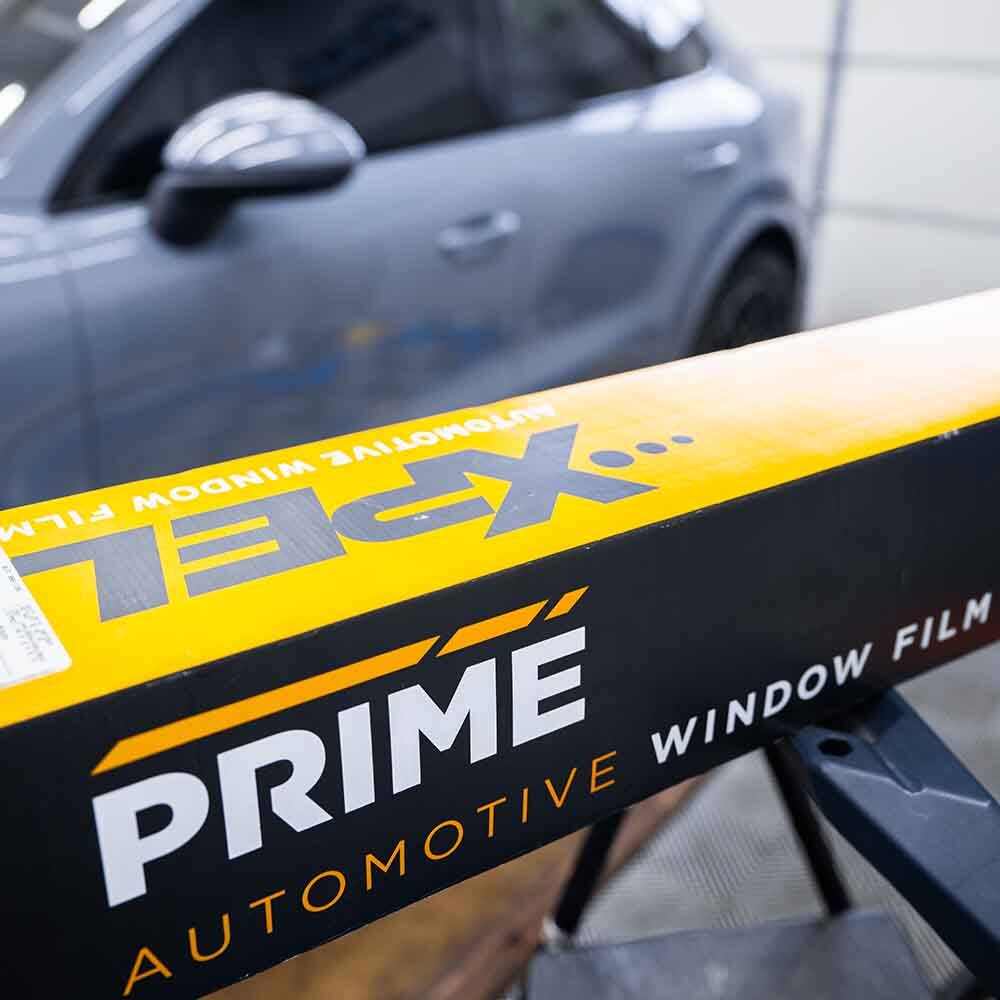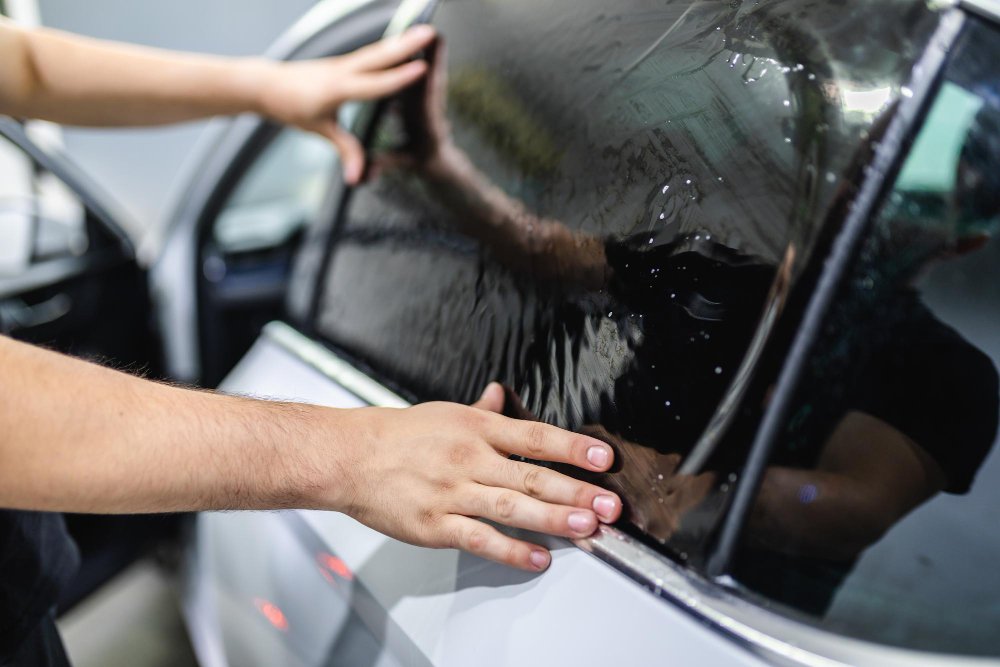A Comprehensive Guide to Understanding Automobile Home Window Tint and Its Advantages
Vehicle home window tinting offers greater than simply an aesthetic objective for automobiles. It uses various kinds, each with unique functions and benefits. Comprehending these choices, together with legal laws and maintenance suggestions, is essential for any type of car proprietor. The benefits might considerably improve driving comfort and automobile long life. As one discovers the nuances of home window tinting, the inquiry arises: what sort of tint is best suited for private demands?
Recognizing Car Window Tint: What It Is and Exactly how It Works
Auto window tint acts as a safety barrier that improves automobile aesthetic appeals while giving practical benefits. This slim film is related to the indoor surface area of vehicle windows, decreasing glare and blocking dangerous ultraviolet (UV) rays from the sunlight. By filtering sunshine, vehicle window tint helps to control the interior temperature of the vehicle, resulting in enhanced convenience for guests and reduced dependence on air conditioning.Additionally, it safeguards the car's interior from fading, protecting both furniture and control panel products. The tint can additionally boost privacy, making it harder for outsiders to see inside the lorry. Furthermore, particular kinds of home window tint can increase safety and security; in the event of a mishap, the movie assists hold shattered glass with each other, minimizing the risk of injury from flying shards. Overall, vehicle window tint offers both visual and useful purposes, making it a prominent choice among vehicle owners.
Types of Window Color: A Review of Options
When thinking about window tint options, numerous types are readily available, each with unique features. Dyed, metalized, and ceramic window colors supply differing levels of heat being rejected, UV security, and aesthetic charm. Understanding these distinctions can help car proprietors make informed selections based on their choices and needs.
Colored Window Color
Dyed window color represents a prominent option among cars and truck owners seeking a efficient and affordable way to enhance their car's appearances and personal privacy. This kind of tint is produced by positioning a layer of color between a protective finish and an adhesive layer, leading to a darkened appearance that reduces glow and improves visual comfort. While colored home window color properly blocks hazardous UV rays, it may not offer the same level of heat denial as various other tint kinds. Additionally, its color can discolor over time, potentially diminishing its effectiveness. Regardless of these downsides, dyed window tint stays popular for its cost-effectiveness and ability to give a streamlined, stylish want to various vehicle versions.
Metalized Home Window Tint
Metalized window tint uses an equilibrium of design and capability, making it a popular choice among car proprietors. This kind of tint includes metal bits within the film, enhancing both visual appeal and warmth denial. The reflective quality of metalized color aids to minimize glow and enhance personal privacy, while additionally providing UV defense, which safeguards the lorry's inside. Furthermore, metalized window color can strengthen window strength, possibly protecting against ruining during crashes. It is essential to note that the metallic components can conflict with electronic signals, such as GPS and cell phone reception. Generally, metalized home window color provides an efficient remedy for those seeking a combination of appearance, sun, and durability protection for their vehicles.
Ceramic Home Window Tint
Ceramic home window tint stands for an innovative option in the range of automobile home window films, supplying distinct benefits over traditional colors. Unlike dyed or metalized films, ceramic colors use innovative ceramic particles, which properly decline heat and UV rays without compromising presence. This technology ensures that lorries stay cooler, minimizing dependence on air conditioning and boosting gas efficiency. Furthermore, ceramic home window colors are less likely to conflict with digital tools, such as GPS or mobile signals, making them a functional selection for modern cars. Their toughness and scrape resistance add to a much longer lifespan compared to various other kinds of colors. Generally, ceramic home window color supplies premium performance, comfort, and security, making it a favored choice for critical lorry proprietors.
Advantages of Vehicle Home Window Color: Beyond Aesthetic Appeals
While many individuals associate automobile window tint with improved design, its advantages prolong far beyond plain aesthetics. One significant advantage is warmth decrease; home window tint can block up to 99% of hazardous UV rays, keeping the indoor colder and securing furniture from fading. This not only enhances convenience during heat yet also minimizes dependence on a/c, bring about boosted gas efficiency.In enhancement, vehicle home window tint offers an included layer of personal privacy and safety. Tinted home windows make it challenging for outsiders to see inside the vehicle, which can discourage burglary and secure belongings. Furthermore, many colors enhance the glass, decreasing the probability of shattering in the occasion of a mishap, thus boosting safety.In addition to these useful benefits, auto window tint can likewise contribute to glow decrease, boosting exposure for passengers and vehicle drivers alike. This diverse approach to comfort and safety and security makes window color a useful financial investment for lorry owners.
Lawful Considerations: Tinting Rules by State
Before devoting to auto home window color, vehicle proprietors must navigate an intricate landscape of tinting regulations that vary by state. Each state has details legislations controling the acceptable degrees of color darkness and reflectivity for different windows, consisting of windscreens, front side home windows, and rear windows. These laws typically consist of noticeable light transmission (VLT) percentages, which dictate just how much light can pass through the tinted glass.Some states permit darker colors on back home windows while restricting front side and windscreen colors for safety and security reasons. Additionally, specific states might require a certificate from the producer to confirm conformity with tinting regulations. Violating these policies can lead to fines, required removal of the tint, or both. It is vital for lorry proprietors to investigate their state's regulations completely to ensure lawful compliance before setting up window tint. This persistance can here conserve time and cash in the future.
Choosing the Right Tint: Elements to Consider
When choosing the suitable window tint for a car, several vital aspects enter play. Tint darkness degrees, UV defense rankings, and compliance with legal regulations are important factors to consider to guarantee both looks and capability. Reviewing these facets will aid individuals make an enlightened decision that meets their demands and sticks to local regulations.
Color Darkness Levels
Selecting the suitable tint darkness degree is crucial for accomplishing the desired equilibrium between aesthetic appeals and capability in vehicle home window tinting. Different states have varying lawful policies regarding color darkness, which can impact the selection. Normally, tints are gauged in percentages, with reduced percentages showing darker shades. Darker tints offer raised personal privacy and a sleek appearance yet can decrease presence, particularly during the night. On the other hand, lighter colors maintain an even more open feel, making sure adequate exposure while still giving some warm and glow decrease. When making a decision, people need to consider their driving practices, local laws, and individual preferences. Inevitably, the right color darkness degree boosts the automobile's appearance while guaranteeing safety and compliance with lawful requirements.
UV Security Score
Tint darkness degrees play a substantial function in the total performance of car home window tinting, yet one more vital element to assess is the UV security score of the chosen color. This score shows the percent of hazardous ultraviolet rays that the tint can block. Top notch colors often offer 99% or more UV security, protecting travelers and the car's interior from sun damage. Davinci of Michigan. Long term direct exposure to UV rays can cause skin troubles and fading of furniture, making a high UV security rating vital for health and wellness and durability. When choosing window color, consumers should prioritize this rating alongside darkness degrees to assure optimum comfort and safety while driving. Comprehending these elements help in making a notified choice when investing in vehicle home window tinting
Lawful Regulations Conformity
Comprehending regional legal regulations is vital for any person taking into consideration automobile window tinting. Each state or area has certain laws controling the allowed levels of color darkness and reflectivity for various windows. These regulations frequently define the noticeable light transmission percentage, determining just how much light can go through the tinted glass. Non-compliance can bring about fines, necessary elimination of the color, or issues throughout vehicle examinations. Furthermore, some locations may have limitations on using particular tinting products, requiring customers to choose items that meet security standards. It is important for automobile proprietors to investigate their local laws extensively before choosing window tint to assure compliance and stay clear of possible legal problems.

Setup Process: do it yourself vs. Specialist Providers
Exactly how does one choose between a DIY installment and working with professional services for car window tinting? The choice typically rests on spending plan, experience, and wanted outcomes. A DIY method can be economical, enabling individuals to reduce labor prices. Nonetheless, it needs a specific level of ability and expertise concerning the tinting procedure. Those that are thorough and individual may find success with do it yourself packages offered in the market.Conversely, professional services supply knowledge and high-grade products, making sure a remarkable finish. Experts commonly ensure their work, providing tranquility of mind against possible issues such as gurgling or peeling off. Additionally, they know with local legislations concerning tinting, which can be intricate for the typical car owner.Ultimately, the choice reflects a balance in between cost, personal capacity, and the anticipated high quality of the tinting work. Each choice has its advantages, and the most effective option relies on private circumstances and choices.
Upkeep Tips: Keeping Your Color in Top Problem

Often Asked Inquiries
How Long Does Window Tint Usually Last on a Car?
Window color normally lasts between 5 to 10 years, relying on elements such as quality, application, and ecological conditions. Routine upkeep and appropriate treatment can extend its life-span, making sure perfect efficiency and appearance gradually.
Can Window Tinting Damages My Car's Original Glass?
Home window tinting, when used properly, does not harm a car's initial glass. Incorrect setup or low-grade products may lead to problems like gurgling or peeling off, possibly influencing the glass's integrity over time.
Is Home Window Tinting Safe for All Kinds Of Automobiles?
Home window tinting is usually secure for most automobiles, supplied the movie abides by local policies and is effectively used. However, some specialized cars may need specific factors to consider, making it vital to seek advice from experts prior to installation.
Will Window Tinting Space My Auto Warranty?
The concern of whether home window tinting gaps an automobile service warranty often depends on the maker's plans. Usually, if the tint does not damage the car, guarantees commonly continue to be undamaged. Getting in touch with the dealer is advisable.
Can I Eliminate Window Tint Myself if Needed?
Removing window tint oneself is feasible, yet it calls for mindful focus to stay clear of harming the glass. People ought to utilize appropriate tools and techniques to guarantee a successful elimination without leaving glue deposit or scratches behind. While colored window color effectively blocks damaging UV rays, it may not use the same level of warmth being rejected as other tint kinds. Ceramic home window color stands for an advanced alternative in the spectrum of automobile home window films, supplying distinctive advantages over standard tints. Prior to committing to vehicle window color, car proprietors must navigate a complicated landscape of tinting regulations that differ by state. These regulations often consist of noticeable light transmission (VLT) portions, which determine how much light can pass with the tinted glass.Some states allow darker colors on rear windows while limiting front side and windscreen tints for security factors. Color darkness levels play a considerable duty in the overall effectiveness of auto window tinting, however an additional essential aspect to review is the UV protection score of the picked color.